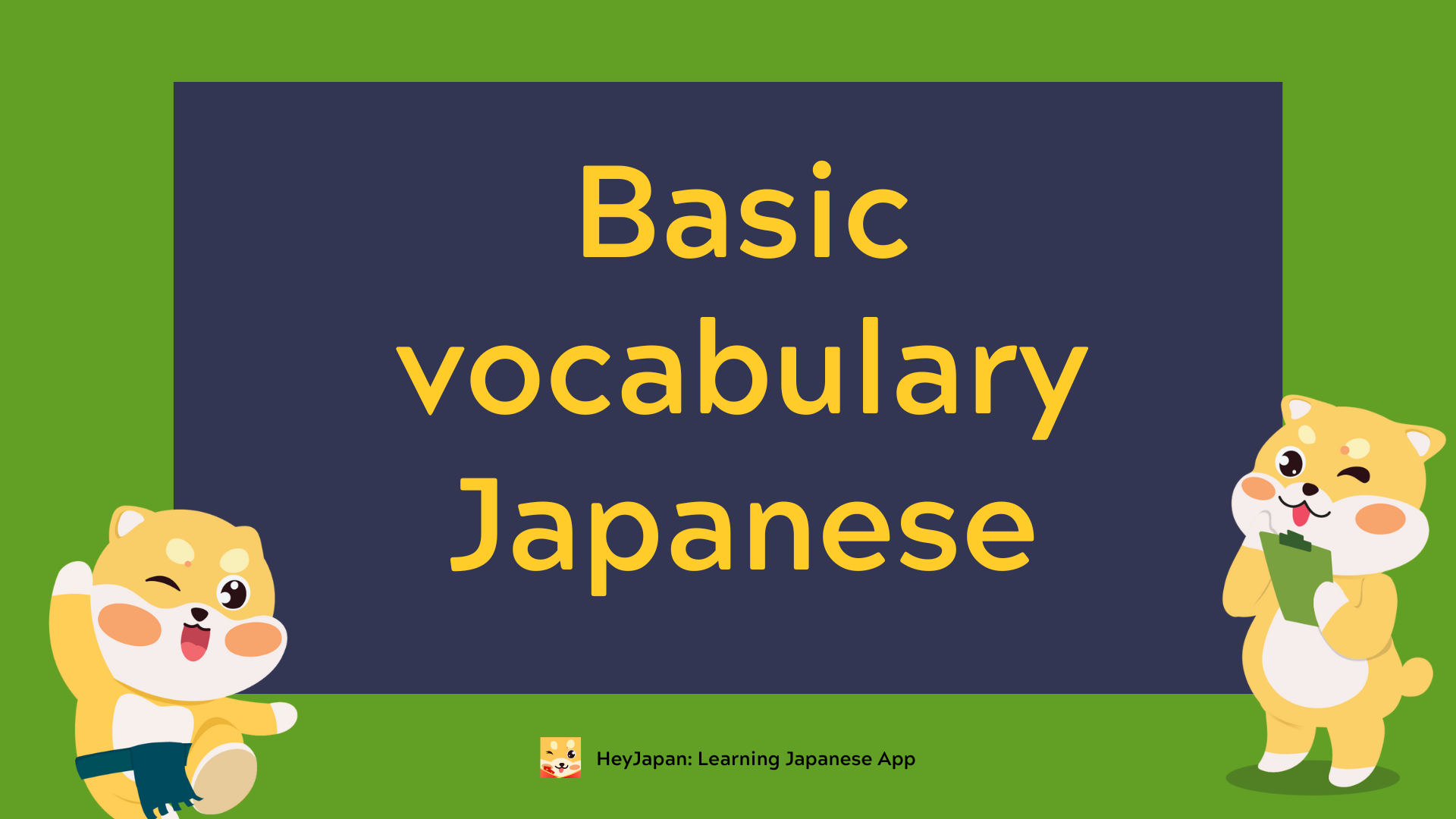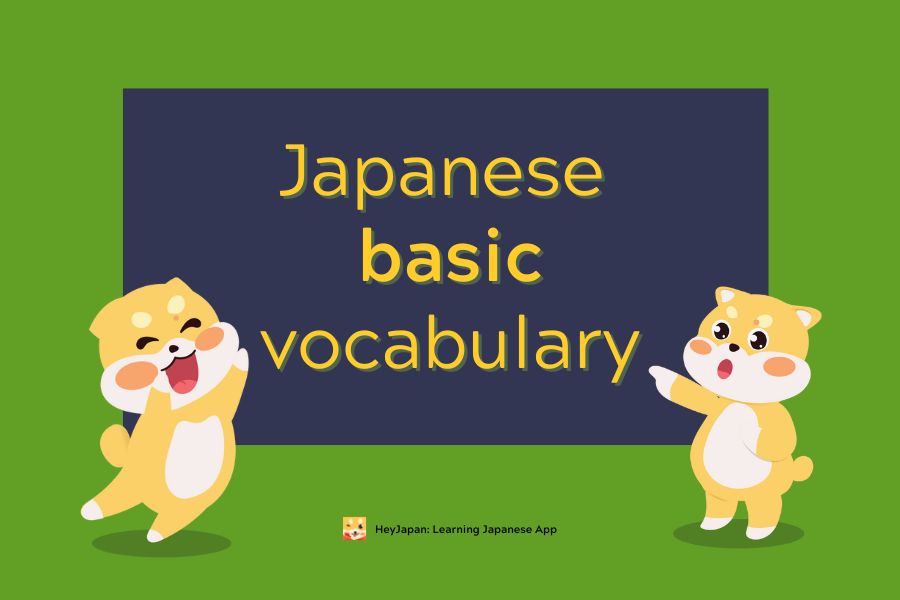- 1. Greetings
- 2. Numbers
- 3. Family Vocabulary
- 4. Time Vocabulary
- 5. Colors
- 6. Common Verbs
- 7. Adjectives
- 8. Questions Vocabulary
- 9. Places Vocabulary
- 10. Everyday Objects Vocabulary
Are you learning Japanese and looking for a comprehensive list of vocabulary to help you communicate better? Whether you're a beginner or an intermediate learner, having a solid vocabulary base is essential for understanding and participating in conversations.
In this article, we'll provide you with a carefully curated list of Japanese vocabulary covering essential topics like greetings, family, time, and more. These words will help you in real-life situations, from ordering food to traveling around Japan. Let’s dive into the most useful Japanese vocabulary for everyday communication!
1. Greetings

In Japan, greetings are important as they reflect politeness and respect. Here are some essential greetings to start your conversations:
- こんにちは (Konnichiwa) – Hello / Good afternoon
- おはよう (Ohayou) – Good morning (informal)
- おはようございます (Ohayou gozaimasu) – Good morning (formal)
- こんばんは (Konbanwa) – Good evening
- さようなら (Sayounara) – Goodbye
- ありがとう (Arigatou) – Thank you
- すみません (Sumimasen) – Excuse me / I’m sorry
- よろしくお願いします (Yoroshiku onegaishimasu) – Nice to meet you / Please take care of it
2. Numbers

Knowing numbers is crucial for daily tasks, such as shopping, traveling, or ordering food. Here’s a quick list of basic Japanese numbers:
- いち (Ichi) – One
- に (Ni) – Two
- さん (San) – Three
- よん (Yon) – Four
- ご (Go) – Five
- ろく (Roku) – Six
- しち (Shichi) – Seven
- はち (Hachi) – Eight
- きゅう (Kyuu) – Nine
- じゅう (Juu) – Ten
3. Family Vocabulary

When talking about your family or introducing them to someone, you will need these basic family terms:
- お父さん (Otousan) – Father
- お母さん (Okaasan) – Mother
- 兄 (Ani) – Older brother
- 姉 (Ane) – Older sister
- 弟 (Otouto) – Younger brother
- 妹 (Imouto) – Younger sister
- 祖父 (Sofu) – Grandfather
- 祖母 (Soba) – Grandmother
- 子供 (Kodomo) – Child
4. Time Vocabulary

Time is a crucial concept in any language, especially in Japanese. Here are words related to time:
- 今日 (Kyou) – Today
- 明日 (Ashita) – Tomorrow
- 昨日 (Kinou) – Yesterday
- 今 (Ima) – Now
- 時間 (Jikan) – Time
- 時 (Toki) – Hour
- 分 (Fun / Bun) – Minute
- 月 (Tsuki) – Month
- 年 (Nen) – Year
5. Colors

Colors are essential when describing things or shopping. Here are some basic colors in Japanese:
- 赤 (Aka) – Red
- 青 (Ao) – Blue
- 黄色 (Kiiro) – Yellow
- 緑 (Midori) – Green
- 黒 (Kuro) – Black
- 白 (Shiro) – White
- 茶色 (Chairo) – Brown
- ピンク (Pinku) – Pink
- 灰色 (Haiiro) – Gray
6. Common Verbs
To communicate effectively, you must learn the most frequently used verbs. Here are some key verbs:
- 行く (Iku) – To go
- 来る (Kuru) – To come
- 見る (Miru) – To see
- 聞く (Kiku) – To ask / To listen
- 食べる (Taberu) – To eat
- 飲む (Nomu) – To drink
- 書く (Kaku) – To write
- 読む (Yomu) – To read
- 寝る (Neru) – To sleep
- 起きる (Okiru) – To wake up
7. Adjectives
Adjectives help describe people, places, and things. Here are some common adjectives in Japanese:
- 高い (Takai) – High / Expensive
- 低い (Hikui) – Low
- 新しい (Atarashii) – New
- 古い (Furui) – Old
- 大きい (Ookii) – Big
- 小さい (Chiisai) – Small
- 速い (Hayai) – Fast
- 遅い (Osoi) – Slow
- 美しい (Utsukushii) – Beautiful
- 面白い (Omoshiroi) – Interesting
8. Questions Vocabulary

When trying to ask questions, these words will help you gather information:
- 何 (Nani) – What?
- どこ (Doko) – Where?
- いつ (Itsu) – When?
- どうして (Doushite) – Why?
- 誰 (Dare) – Who?
- どう (Dou) – How?
- はい (Hai) – Yes
- いいえ (Iie) – No
9. Places Vocabulary

Whether you're traveling or giving directions, here are common places in Japanese:
- 学校 (Gakkou) – School
- 会社 (Kaisha) – Company
- 家 (Ie) – House
- 店 (Mise) – Store
- 駅 (Eki) – Station
- 病院 (Byouin) – Hospital
- 公園 (Kouen) – Park
- 空港 (Kuukou) – Airport
10. Everyday Objects Vocabulary
For everyday conversations, knowing words for common objects is crucial:
- 本 (Hon) – Book
- 車 (Kuruma) – Car
- 時計 (Tokei) – Clock
- 電話 (Denwa) – Phone
- コンピューター (Konpyuutaa) – Computer
- 机 (Tsukue) – Desk
- 椅子 (Isu) – Chair
- ペン (Pen) – Pen
This list of Japanese vocabulary is a fantastic starting point for beginners or anyone looking to improve their language skills. Whether you're traveling to Japan or studying the language, mastering these essential words will help you communicate effectively in a variety of situations. To continue expanding your vocabulary and learning, use language apps or textbooks, and practice speaking regularly.
Start with these words, build your vocabulary, and soon you'll be conversing in Japanese with confidence!









